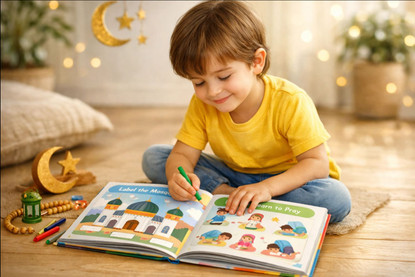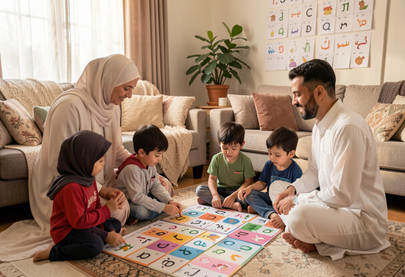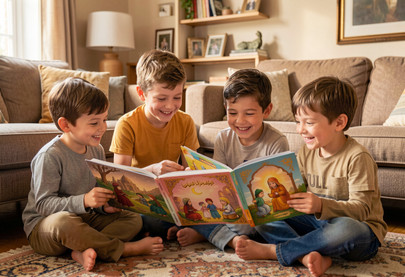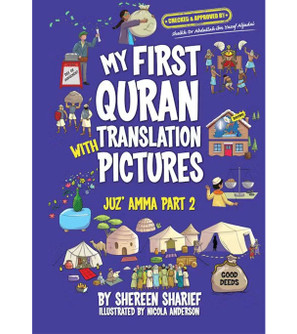Best books for Islamic studies curriculum
Islamic studies curriculum
It’s critical for Muslims to learn Islamic studies for them to truly understand the religion and to attain a strong foundation and knowledge regarding Islam. What is the best method of teaching in Islamic studies? If you want to teach your kids Islamic studies then you can do that easily at home by following a few following tips:
1- Be a role model.
It’s important to know that kids tend to mimic what they see, if you want them to do something then show them that you do the same. If you think about it, that’s how we learned everything that we know now. For example, we learned how to pray by watching our parents pray and following their lead. When we see our parents reciting Quran, we did the same. That applies to teaching kids the Islamic Studies Curriculum and helping them acquire the required knowledge.
2- Learn about Islam to be able to teach it correctly.
Now the second step is to read about Islam, understand how a true Muslim should be, do good deeds and make the Quran and Adkhar a main part of your daily routine. Always keep in mind we are never too old for learning. And you will understand as you keep finding out new things that you didn’t know about while teaching your children about the Islamic religion. Now when your kids see how you spend your day understanding and learning Islam, they will do the same. Also, Islamic studies are like a big ocean, and to be a good teacher you should increase your knowledge. You can do that by reading some of the best Islamic books, like books of the scholars, watch YouTube videos, listen to the scholar’s lessons, they are available online so you don’t have to worry about that. And for the books, you can buy it from any Islamic bookstore.
3- Learn about the prophet's life and his teachings.
The best way to learn about Islam is from the prophet himself, learn how he lived his life and his teachings. There is a great book called ‘Life Of Rasulullah Makkah Period.’ This book teaches us about what the Prophet went through at the beginning of revelation and the events that occurred at his residence in Mecca. Life Of Rasulullah Makkah Period book explains the life of the prophet in a way that helps the reader learn from and understand what it means to be a true Muslim with good behavior. The book is divided into chapters and each one of them starts with a new story. Some of the Lessons of this book are:
- If Allah wished, Allah could let Aminah, Abdullah, and Abd al-Muttalib live longer so that our beloved Prophet Hazrat Muhammad (SM) doesn’t become an orphan. But Allah didn’t do this. What could be the divine wisdom behind the tragedies in Rasulullah’s (S) life?
- Allah could let the Quraish win over Abrahah, but why it didn’t happen, and what could be the divine reason behind it?
- Why did Abu Talib ibn Abd al-Muttalib help and protect Prophet Hazrat Muhammad (SM) when he was fully aware that he was working against pagan religious ideologies?
- Prophet Hazrat Muhammad (SM) prayed to Allah to make either Umar al Khattab or Abu Jahl accept Islam. Umar al Khattab accepted Islam, but why Abu Jahl did not accept Islam?
- Prophet Hazrat Muhammad (SM) sent some Muslims to Abyssinia in order to avoid oppression; however, he didn’t include any people who were severely oppressed. What could be the divine wisdom behind this act?
This book truly helps the reader understand everything about Islamic history. There’s also another book called ‘Life Of Rasulullah Madinah Period.’ This book teaches us about what the Prophet went through and the events that occurred at his residence in Madinah. Life Of Rasulullah Madinah Period book explains the life of the prophet in a way that helps the reader learn from and understand what it means to be a true Muslim with a good behavior. The book is divided into chapters and each one of them starts with a new story. Some of the answers included in this book are:
- After arriving in Madinah, Muslims got permission to fight. Why Muslims didn’t get permission during the Makkah period when the Muslims were oppressed and tortured most?
- Muslims achieved a resounding victory during the Battle of Badr, but the Battle of Uhud was quite a different story. What could be the divine wisdom for allowing the Muslims to suffer in the Battle of Uhud?
- During the Battle of The Trench, the siege of Madinah lasted about 25 days. Eventually, without fighting an actual battle, Muslims could defeat their enemies. What was the divine wisdom behind making the siege lasted so long? What lesson can we learn from this battle?
- Abdullah Ibn Ubayy, a notorious hypocrite, worked his entire life to destroy Islam. Umar Ibn Al-Khattab wanted to kill him on several occasions. Even, the son of Ubayy asked for Rasulullah’s (S) permission to kill his own father. But, Rasulullah (S) did not give him permission. What could be the reason behind this?
- The slander against Rasulullah’s (S) wife ‘Ā’ishah had been unresolved for about a month; however, after a month, a divine revelation declaring the innocence was sent. What could be the divine wisdom behind this delay?
- Muslims didn’t have to fight a battle during the expedition to Tabuk; however, they suffered a lot in the hot summer during this journey. Allah could have informed Rasulullah (S) about the Byzantines not showing up for the Battle to relieve the distress of Muslims. What could be divine wisdom behind that expedition?
- After the Battle of Badr ended, Rasulullah (S) released the war prisoners before receiving divine permission for such action. What was the divine wisdom for not sending the permission?
It would be a good idea to read those two books to understand the Islamic religion more and to be able to teach it to your kids.
4- Teach your children about Islamic studies in a fun way.
Kids enjoy pictures and images and it makes the information stick in their brains, there are many Islamic studies books that are made for kids to make learning fun. For example, there is a set of books called ‘Goodword Islamic Studies’ that uses colorful images and fonts that will catch the kid’s interest.
5- Use crafts to make learning fun.
Explain the lessons using handcrafts, for example, you could draw the story to explain it in a fun way and use your imagination.
6- Read with your child.
Make daily time for Islamic book reading, sit with your kid and read to him, and explain anything that sounds hard for him/her to understand. And it would be better if you read it to them in the form of a story and make them interact with you. Ask them questions and reward them when they answer correctly. This way they will love the reading time and will learn a lot from it.
What books should I read to learn Islam?
Here are some of the best Islamic studies books:
1- Goodword Islamic Studies (Set):
A set of books that are designed in a beautiful and colorful structure to catch the child's interest, with many images. It is made to teach kids about Islamic studies in an easy way to understand. The lessons in this set are based on Quran and hadith. The book doesn’t teach moral principles directly, no it teaches through themes chosen from the Quran and Islamic sources. The main part of this book is taken from the holy Quran and after each part, there are exercises to test the student's understanding. Goodword Islamic Studies books are great for home teaching as well as school classes.
2- Islamic Studies Level 1 (Revised & Enlarged Edition):
This book is designed for kids between 5 to 7 years old. The lessons are presented in a structured order and it is divided into 6 units with a total number of chapters of 28. The Level 1 book introduces students to the fundamentals of Islam. These students have very little or no knowledge about Allah, Islam, the Qur’an, and the Messenger. The lessons in this book attempt to walk students through the basics of Islam. Assuming students have no prior knowledge, the book takes the first step toward formal curriculum-based learning. The goal here is to keep it simple and enjoyable, yet informative. Each chapter provides the Islamic foundation appropriate for this age group. The lessons in this book are on Allah, the Qur’an, Islam, Rasulullah (S), the Hadith and Sunnah and 5-pillars of Islam, Messengers of Allah, Akhlaq and Adab in Islam, and so forth. The idea is to cover the basics of Islam. Each lesson begins with a coloring page. The coloring time helps students settle down and be comfortable in the class before the lesson begins. The attention span of children is small; therefore, short paragraphs introduce two or three concepts.
3- Islamic Studies Level 2 (Revised & Enlarged Edition):
All lessons are presented thematically in distinct units. Unit 1 focuses on the Creator and His message. This unit answers questions about Allah, Islam, faith, and the Qur’an. Unit 2 covers topics on our Ibadat-focusing on the five pillars of Islam. Unit 3 covers the stories of some of the Messengers. Unit 5 describes proper adab and akhlaq learned from the Qur’an and authentic sunnah of the Messenger (s). Each lesson begins with a coloring page. The coloring time helps students settle down and be comfortable before the lesson begins. The attention span of children is small; therefore, short paragraphs introduce two or three concepts.
4- Islamic Studies Level 3 (Revised & Enlarged Edition):
The Level 3 book further develops the basic concepts learned previously. The book has 6 units and 29 lessons. Students will learn why we worship and the reasons for worshipping in prescribed formats. Students will also learn the qualities of our Iman and some of the duties Allah wants us to perform in addition to our ritual duties. The life of Nabi Muhammad (S) is divided into Makkah and Madinah periods to provide additional details. A brief history of some of the messengers of Allah is also included. Topics on Islamic adab and akhlaq continue to be covered in this grade. All lessons are presented thematically in distinct units.
5- Islamic Studies Level 4 (Revised & Enlarged Edition):
All lessons in this book are thematically presented in distinct units. Topics in the Level 4 book are diverse and are presented in greater detail. Learning about Allah remains an important focus of the entire series, as well as the life of Nabi Muhammad. The unit on how Islam changed Arabia takes a closer look at the life of Nabi Muhammad before and after receiving divine revelations. Several topics on the Fiqh of salat are introduced. The lives of the four caliphs are covered in greater detail in order to explain their contributions to Islam. Several moral-building lessons are also included.
6- Islamic Studies Level 5 (Revised & Enlarged Edition):
All lessons are presented thematically in distinct units. The first few chapters in the Level 5 book focus on the Creator and His message. Chapter 2 explains why we should worship Allah. Chapter 4 discusses the uniform activities of the messengers, and dispels many of the misconceptions about them. Unit 2 provides details about the important battles and their impact on the history of early Islam. Unit 3 offers a history of some of the messengers, particularly focusing on the morals to be learned from the messengers’ lives. Unit 4 covers Islam in the World while Unit 5 teaches students to take a close look at some Islamic values and teachings, and encourages them to adopt these values.
7- Islamic Studies Level 6 (Revised & Enlarged Edition):
Like other books in the series, the Level 6 Islamic Studies book contains a vast range of topics. Unit 1 begins with several lessons on the Creator, His promise, His books, and His Teachings. Unit 2 covers some topics on the Qur’an and Hadith while Unit 3 looks into the Fundamentals of Deen. Unit 4 covers the lives and missions of several Messengers of Allah with a focus on understanding the legacy of their faith and character. Unit 5 introduces topics related to three illustrious women of Islam. Unit 6 covers topics on the invisible to provide an understanding of ruh, nags, angels, jinn, and shaitan. Unit 7 includes practical information about our current society while Unit 8 looks into developing Islamic values.
8- Islamic Studies Level 7 (Revised & Enlarged Edition):
All lessons are presented thematically in distinct units. Unit 1 focuses on the Creator and His religion. This unit answers questions about Allah, Islam, faith, and the Quran. As in other levels, the stories of some of the Messengers are discussed in Unit 2. A few other fascinating stories from the Quran are presented in Unit 3. Unit 4 discusses the life and contributions of two companions who shaped the early history of Islam. Several diverse topics to enrich students’ knowledge are discussed in Unit 5. Unit 6 describes several moral and ethical issues addressed in the Quran. Proper adab and akhlaq learned from the Quran are the best.
9- Islamic Studies Level 8 (Revised & Enlarged Edition):
All lessons are presented thematically in distinct units. Unit 1 begins with several lessons on the Creator and His message including His divine names, and the Sunan of Allah. Nabi Muhammad (S) and the challenges he faced in Madinah are subjects of Units 2 and 3. Unit 4 provides an Islamic ethical framework to create the foundation of an ideal Islamic society while Unit 5 covers Islamic values and teachings. Unit 6 covers some topics from Islam after the death of Nabi Muhammad.
What should be the curriculum of an Islamic system of education?
Omar Muhammad al-Toumy al-Syaibani revealed that the characteristics of the curriculum of an Islamic system of education should be as follows:
- Highlights religious and moral goals on the various purposes and content, methods, religious tools and
- techniques.
- Extends the scope and thoroughness of its content that is the curriculum that truly reflects the spirit, thoughts, and comprehensive teaching. The curriculum should also pay attention to the development and guidance of all aspects of the student's intellectual, psychological, social, and spiritual life.
- Being balanced among the various sciences contained in the curriculum. In addition, it is also balanced between useful knowledge for individual and social development.
- be thorough in organizing all subjects needed by the students.
- The curriculum is always tailored to the interests and talents of students
Al-Syaibani mentioned 7 principles of the Islamic curriculum, and they are:
- Perfect linkage with religion, including its teachings and values. Each part contained in the curriculum, starting from the purpose, content, teaching methods, ways of treatment, and so on should be based on religion and Islamic values. The curriculum must have the spirit of the Islamic religion. The virtue of the goals and concerns must be based on Islamic teachings.
- Universal purposes and content of the curriculum, which includes the purpose of developing aqidah, minds, and other things beneficial to society in spiritual, cultural, social, economic, and political development; including the sciences of religion, language, humanity, physical, practical, professional, art and so on.
- a relative balance between goals and content.
- Associating the talents, interests, abilities, and needs of the learners as well as between the natural surroundings, both physical, and social where the students live and interact.
- Maintaining individual differences among students, both in terms of interest and talent.
- Accepting the development changes in accordance with the development of the times and places.
- Relating the various subjects with the experiences and activities contained in the curriculum. In this case, religious nuance is very obvious. The series of subjects contained in the curriculum, all leading to the One. This was also applied to the Prophet's education, to the time of the dynastic era. In general, educational curriculum principles contain three main things; continuous, sequential and experience integrity. Thus, besides the curriculum is a series of interconnected materials, it must also be arranged in sequence and leveled, systematically directed to obtain educational objectives.
What are the five most important areas of Islamic studies?
In the Islamic studies curriculum, students should learn about Quran, Fiqh, kalam, hadith, and tafsir.
















